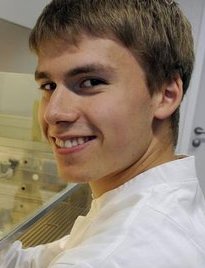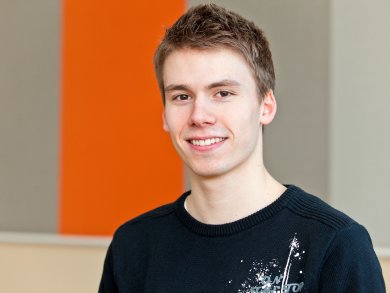The “Freiwilliges Soziales Jahr” (FSJ, voluntary social year) is a Government-funded voluntary work program for young adults based in Germany and Austria. It is often undertaken between school and university. The voluntary work is usually performed in the social sector, in hospitals, nursing homes, or with youth welfare services. In September 2011, the equivalent scheme for sciences began with a pilot-project based at the Medizinische Hochschule Hannover (MHH, Medical School in Hanover) and Leibniz University Hannover, Germany.
Robin Schuchmann – one of the 56 students on the scheme – talks to Dr. Vera Koester from ChemViews magazine about his experience so far, how it impacts his future, and what he thinks of science education in schools.
Can you tell us a bit about the voluntary social year in general and give details about the one you are on?
When people do not want to study immediately after school, they normally do an internship or do a voluntary social year (FSJ). In this voluntary year, they work, for example, in a nursing home, a hospital, a kindergarten or a sports club and look after the people there. In addition, everyone has to visit different seminars in which you learn important things for your work and your future career.
I am on a FWJ (Freiwilliges Wissenschaftliches Jahr, voluntary scientific year). Except for the seminars, my year is a bit different. I work in a lab. Because it is a new environment for me, I first had to become familiar with everything. For the first few days, I went around with different colleagues and had a look at what they were doing. They showed me the whole lab and gave me an overview of all the machines/the laboratory equipment and explained what they are for.
The next few weeks, I mainly tried to acquire the fundamentals of immunology – which is the most important part of the work in this lab – and other important topics in biology by reading books. It was important to know more about the things they do in the lab before I started working on my own.
With time, I worked more in the lab, did a few experiments for colleagues and helped where I could. I gained a lot of experience because I did many different things.
Now, I work together with a Ph.D. student. Of course I still need help with a few things, but I work most of the time on my own and get more and more practice in the lab.
How did you find out about this position?
I do not live in Hanover, and this voluntary social year in lab was not advertised that much in my region. Actually, I would not be here, if my father had not shown me an article in our daily newspaper. It was just a very short text on the last page. At that time, I was trying to figure out what I wanted to study after school. One of my favorites was biology, but I was not sure, so I decided to try to get a place at the Medical School in Hanover and luckily it worked.
And is it meeting your expectations?
Yes, mostly, it is. I came here to see what working in a lab is like and after being here for nearly half a year, I have got a deep insight. Honestly, before I came here I sometimes hoped that working in research means to find out new “ground-breaking” things. What I’ve learned in the lab is that you often have to work on one thing for a really long time before you find out something new.
So what do you like most?
I like that I get an insight in the life of a laboratory, which was my aim when I decided to come here. I have very friendly colleagues who always are patient and appreciate when I do not understand something or do not know what to do next.
Because we have English-speaking colleagues here, we speak English for most of the time. Hence, my English is getting better, which is important for the future.
Another point is that I got to know some other people of my age who also do this voluntary year and with whom I can exchange experiences and also do something in Hanover.
Would you recommend this for other students interested in chemistry or other sciences?
Definitely. This year is very interesting for everyone who is interested in medicine, biology, chemistry, physics or other sciences. I am interested in biology, so I came to this lab, but there are many other possibilities, so everyone can find a fitting topic.
Also it is not only for people interested in sciences. I know a few people who want to study, for example, economics and came here to get insight into something completely different. A few of them also changed their minds. However, most students over here want to study medicine afterwards.
You get a lot of actual lab experience here, which is completely different to the science stuff you do at school. Here you can find out whether you really want to study biology or other sciences as you see what kind of work waits for you after studying.
How do you think this will help your future career?
If I study biology or medicine, then this will help me because I have much experience in working in the lab now and I have learned a lot about immunology.
And if I was not here, I still would have started to study biology – probably because it was the degree course I favored the most at school. But to be honest, I have changed my mind a bit during this year, so that I am not sure whether I really want to study biology anymore.
What made you change your mind?
When everything works fine in lab, it is really fun. But I also see that laboratory work can be very frustrating. It mostly needs a really long time to make substantial progress. When an experiment does not work for weeks and you do not know why, or a machine is not working well, it is really hard to keep calm.
But each job has its pros and cons, and maybe I will think differently after the second half of this voluntary year.
But no matter if this year shows me that biology is the right course for me or not, I definitely do not regret my decision to do this.
So what are the possible alternatives for you to study afterwards?
If my mind does not change again in the next six months, I want to study industrial engineering. I think it is very interesting to get a broad basic knowledge of many different subjects like electrical engineering, economics, and mechanical engineering. These are all subjects I am very interested in as well. I still really like biology, but because of the above-mentioned reasons I do not think it is my preferred degree course any more.
What got you interested in sciences?
There are different reasons I got interested in sciences. Both of my parents are biologists, so I came in contact with it very early. Also biology and chemistry were always my favorite subjects in school. I wanted to know how things work in nature.
What do you think about how sciences are taught in school?
When I came here, I realized that in school you just get to know the very basics of sciences. In school there is attention given to a lot of topics, to give a rough overview. With this bit of knowledge you are able to explain many things that happen in nature logically. That is why I found this so interesting.
For me, the sciences – at least biology, chemistry and math – in school were not very hard to understand – not as hard as French, for example. But it was not boring as well. Quite the contrary, it aroused my interest.
How important do you think is it to have some scientific knowledge today?
It is not bad to know a few things about sciences to understand some of the connections in nature. You do not have to know how to explain life and the universe, but some knowledge is good so you can walk through this world with open eyes and not be blind.
What do you think would attract more students to sciences?
The first thing many people think when they hear sciences is “boring”, “I do not understand it anyway” or “too much to learn”. So the first thing should be to abolish those prejudices. Sciences do not enjoy a good reputation among the young people like me, and that is the biggest problem I guess.
Teachers should draw the interest of the students by using modern media, show videos, and use digital whiteboards. This automatically will make a “boring” topic more interesting. Another thing is to teach with reference to the practical. It is easier to learn that way. What makes this even more interesting is to show actual relations to the world.
This voluntary year, which I am doing right now, is of course also a big step in the right direction to familiarize people with sciences. To give them the opportunity to get deeper insights.
Do you think social media and/or new technologies like iPads or avatars can improve science education?
Well, that is open to dispute. Many people may say that those new technologies distract the students from learning in school, but I think they are not always right. In the time of internet and Facebook, knowledge and important facts develop and spread very fast. People are informed better and faster.
Just a month ago, Apple introduced a new platform for the iPad. They want to bring schoolbooks out on it. I think that is a very good idea. As far as I know, German publishing companies have also just presented a digital schoolbook platform, which has the same concept.
The possibilities that exist with modern devices like the iPad have led many developers to create scientific applications (apps) for students. There is, for example, an app that shows the whole human body in a 3D drawing. You can see every muscle, bone, tendon etc. by navigating through this drawing with your fingers. And if you click on one component it shows you a detailed description for it. There are a lot of apps like this.
For me and I guess for many other people, learning with modern media like this is easier, more interesting and as a consequence more efficient than reading books. This leads again to your question on how to attract more students to sciences.
Learning should not be dry and boring, it should be interesting. With those new technologies we are on a good path to bring sciences to more people.
Thank you very much for this interview!

Robin Schuchmann started the “Freiwilliges Soziales Jahr” (FSJ, voluntary social year) at the Medizinische Hochschule Hannover (MHH, Medical School in Hanover), Germany, in September 2011 after finishing school with the Abitur (university-entrance diploma).
- Medizinische Hochschule Hannover (MHH, Medical School in Hanover), Germany
- Freiwilliges Wissenschaftliches Jahr (FSJ, voluntary scientific year) at the MHH




